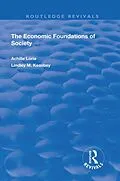This book examines the societies of the civilised world - old and new - and its two distinct and separate classes. Whilst one class accumulates in utter idleness enormous and ever increasing revenues, the other, far more numerous, labours life-long for miserable wages.
One class lives without working, the other works without living or without a life worthwhile. When confronted by such a contrast, the question must at once occur to every mind: is this sad state of affairs the result of inherent necessity, inseparable from the organic conditions of human nature; or is it merely the outcome of certain historical tendencies that are destined to disappear at a later stage of social evolution?
It concludes that the truth is to be found in the latter alternative: that capitalistic property, with its caste division of humanity into capitalists and labourers, is by no means the product of conditions inherent in human nature, but simply the result of powerful historical causes which will eventually disappear. A variety of facts are presented in support of this argument.
Autorentext
Achille Loria born March 2, 1857 was an Italian political economist. He was educated at the lyceum of his native city and the universities of Bologna, Pavia, Rome, Berlin, and London and graduated at the University of Bologna (1877). He became professor of political economy in the University of Siena in 1881; and he held a similar appointment in the University of Padua (1891-1903), and University of Torino (1903-1932). He was elected to the Accademia dei Licei (1901) and appointed to the Italian Senate in 1919. His work draws on a wide range of predecessors: Karl Marx, Herbert Spencer, Charles Darwin, Adolf Wagner and Luigi Cossa, who was his teacher.
Lindley Miller Keasbey, teacher, scholar, and activist, was born on February 24, 1867, in Newark, New Jersey, the son of wealthy and aristocratic Anthony Quinton and Edwina Louisa (Miller) Keasbey. His father, a successful lawyer, had been appointed by President Abraham Lincoln as the United States Attorney for New Jersey, where he served from 1861 to 1886. Lindley Miller Keasbey received his early education at Newark Academy and St. John's Military Academy. He graduated from Harvard with the class of 1888, then attended graduate school at the Columbia Law School and School of Political Science, earning an M.A. in 1889 and a Ph.D. the following year. He earned all these degrees with honors. Then he traveled to Germany and studied at Berlin and Strassbourg. It was while in Germany that Keasbey became acquainted with the work of Achille Loria and the Free Land Theory, a connection that would prove very important later in his life. Lindley M. Keasbey died on September 17, 1946, in Whittier. His papers were given to the University of Texas in the mid-1970s by his daughter at the request of Mazie Mathews, who was writing a master's thesis on Keasbey. The papers are housed in the University of Texas archives at the Center for American History.
Inhalt
Translator's Preface, Author's Preface, Introduction - The Economic Constitution of Society
PART I. The Economic Foundations of Moral Chapter I. The Morality of the Final Society Chapter II. Morality in the Capitalistic Society Chapter III. A Comparison of the Different Systems of Morality Chapter IV. Moral Crises Chapter V. A Critique of the Dominant Theories of Morality PART II. The Economic Foundations of the Law Chapter I. The Economic Basis of Legal Sanctions, Chapter II. The Economic Basis of Legal Transformations - An Historical Demonstration, Chapter III. The Economic Basis of Divers Legal Institutions PART III. The Economic Foundations of Politics Chapter I. Economic Revenue and Political Sovereignty Chapter II. The Bipartition of Revenue and Sovereignty Chapter III. Manifestations of Revenue and Sovereignty Chapter IV. Revolutions of Revenue and Sovereignty Chapter V. Property and Politics Chapter VI. In Answer to Some Objections Conclusion - Economics the Basis of Sociology
